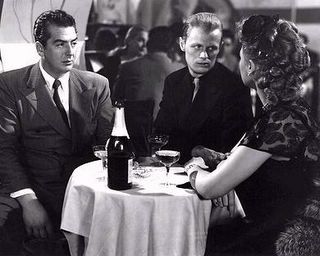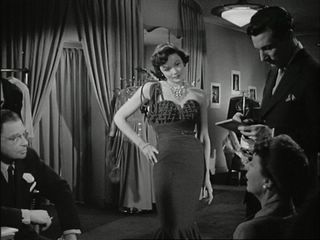Three Fox Noirs
2005 has been a great year for fans of film noir. Not that there have been any great noirs to see in movie theaters. Because there haven't been. Unless you classify Sin City as a noir, in which case there has been one great noir to see in movie theaters in 2005.
Instead, I'm referring to the bounty of amazing 40's and 50's noir films released on DVD this year by Warner Brothers and 20th Century Fox. Warners put out a great box earlier this year, featuring classics like Born to Kill and Clash by Night, which isn't really a noir but is a terrific movie directed by Fritz Lang, so I'm not going to complain.
For my money, though, the best noir on DVD this year has come from Fox. They've been releasing, in groups of three, terrific titles on reasonably-priced DVD's boasting clear, pristine transfers, and even expert commentaries and other features. Past winners have included Samuel Fuller's House of Bamboo, Otto Preminger's incredible Laura, the Tyrone Power carnival-themed thriller Nightmare Alley and the trippy hyponsis mystery Whirlpool. But I think the latest batch, just released last week, may be the best collection yet. Let's take a look, shall we?
Kiss of Death
Lots of these old noirs feature a traditional, stodgy "leading man" in the main role while giving the juicy, interesting roles to character actors and fresh-faced up-and-comers the studio was hoping to introduce to a wider audience. Nowhere is this technique clearer than in Kiss of Death, where we follow around hapless, stiff-as-a-board Victor Mature, but marvel and the slimy unpredictability of Richard Widmark as psychotic hitman Tommy Udo.
The movie is HEAVY and BRUTAL for a 1947 film. In fact, a good deal of the film's more provocative or intense material was cut by censors before the film could be released. Mature plays a career criminal, Nick Bianco, who's arrested during a daring robbery. He refuses to name his accomplices, and winds up serving time alongside Udo, a giggling whackjob with a predilection towards pushing old wheelchair-bound ladies down flights of stairs.
While he's in prison, Bianco's wife commits suicide. Off screen, of course. Worse yet, she leaves behind his young children, who are sent immediately to an orphanage. So, in order to get out of jail and get to his children, Bianco agrees to go undercover in Udo's organization on behalf of the authorities.
It's a pretty clever little set-up that, for no good reason, was totally abandoned for Barbet Schroeder's repehensible 1995 remake. (A film that is only remembered for its shot of Nicholas Cage bench-pressing a stripper.) Schroeder's film took the world of Kiss of Death and made it a cartoon, giving all the characters over-the-top mannerisms and stylized dialogue. The brilliant thing about director Henry Hathaway's original is how everything and everyone is low-key except for Widmark, who plays Udo as a completely insane wildman. This clash of intensity makes him about 100 times more scary.
It's no surprise that Kiss of Death would make him a star. He would play a variety of characters over the years, some good and some evil, but I've never seen him inhabit such a vivid, outrageous character. It's a phenomenal, classic movie performance, full of tough-guy dialogue and enigmatic expressions like the one in that picture above. And that maniacal laugh really sticks with you after the movie's over...I think Ray Liotta might have stolen it for his Henry Hill character in Goodfellas.
The movie builds to a climax that wraps everything up rather elegantly. Like a lot of noirs, the conclusion feels a bit sudden, but unlike a lot of other noirs, it's satisfying without being too sunny or losing its dark, violent edge.
Where the Sidewalk Ends
Another classic noir written by the legendary Ben Hecht, this one focuses on police officer Mark Dixon (Dana Andrews) infamous for roughing up his suspects. When he visits a suspect at home and accidentally kills him, he'll have to cover his tracks fast to avoid the scrutiny of his fellow officers. It's a fiendishly clever story (ripped off a few years ago for the reprehensibly slow and stupid Out of Time, starring Denzel Washington) that director Otto Preminger realizes with near-flawless style and sophistication.
Hecht and Preminger (who also directed Andrews and co-star Gene Tierney in Laura, quite possibly the greatest of all noirs) are endlessly inventive in building up the complications to Dixon's situation. Other cops know he was en route to question the suspect, and everyone knows his reputation as a violent interrogator. As the other cops scramble to build a timeline of the night's events (particularly once a body is uncovered), Dixon must work twice as fast to construct an alibi and throw them off the trail.
In fact, the script is so twisty and clever, it's almost impossible to describe the intricate mechanics of the narrative. But I'll try anyway. In one marvelous suspense sequence, Dixon puts on the victim's clothes and his familiar bandage under the eye, to fool a downstairs neighbor. She'll think she sees the victim get into a cab with bags, skipping town, when really, she's just seeing Dixon posing as the dead man.
Later, the head detective on the case (Karl Malden) will ask Dixon to put on the disguise again as an experiment, to determine if the old lady really could make out the dead man's face through her kitchen window. So Dixon must repeat his same actions before, and pray that this woman doesn't recognize him and uncover his ruse.
There are many more scenes like that, where Hecht and Preminger demonstrate an internal and deep understanding of the mechanics of filmmaking and also a sly, mordant wit. Plus, I love how the film really pays attention to police work, how cops carefully gather evidence to build a timeline, trying to get inside the criminal's heads and understand their behavior from the inside out.
The Dark Corner
I mentioned briefly above the tendency of noirs to include what I called "stylized dialogue." By that, I meant that these characters don't speak so much like actual human beings (particularly actual hoods and criminals). They speak an elevated, self-aware and very cinematic language. In Dark Corner, there's barely one sentence of dialogue that isn't written in elaborate metaphor.
"I got a feeling I'm behind the 8 ball and I don't want you to end up in the corner pocket," a character might say.
Or, "I can be framed easier than 'Whistler's Mother.'"
And, in the line that gives the film its title, "I'm backed into a dark corner and I can't see who's hitting me."
All the characters speak like that all the time. A trick like that would normally grow tiresome, but Dark Corner has an ensemble of actors that just make the thing work by a force of sheer will. That cast includes Lucille Ball in her first noir film, made in 1946, before she became the first massive sitcom star and national icon.
Here, she plays a loyal and wisecracking secretary in the employ of a shady private detective named Bradford Galt (another generic leading man named Mark Stevens). Galt's been set up for murder - someone has killed his old business partner and left the body in his apartment. After conveniently hiding the body under the bed (the maid, apparently, never cleans up under there), he and his secretary set off to find the real killer responsible and bring him to justice.
It's not quite the dazzling, intricate narrative of something like Where the Sidewalk Ends, but Dark Corner is much more about the witty banter and the attitude that defined noir, rather than the crackerjack storytelling or double-crosses.
And the banter is suitably witty, and well-delivered by Ball, William Bendix as another private eye hired to tail Galt, and particularly the incomperable Clifton Webb (another Laura vet) as the wealthy art collector ultimately responsible for the killing. I should also mention that the film, all three of these films in fact, looks absolutely beautiful. Henry Hathaway (who likewise filmed Kiss of Death, as well as previous Fox Noir releases House on 92nd Street and Call Northside 777) doesn't call attention to himself very often, but he can really put together a tight, well-paced set piece.
An early scene in which Ball and Stevens observe Bendix tailing them at a carnival as wonderfully put together, cutting from the couple cavorting and goofing around to Bendix in a bright white suit following close behind and back and forth. Eventually, Ball notices him through a slot in some Vistascope machines. It's just an expertly paced sequence, building a lot of early tension and suspense.
(Remember Vistascope machines? The only place I've ever seen them is Main Street at Disneyland. They're the ones where you put in a penny or a nickel and then wind a little crank and watch a brief film clip. In Dark Corner, Lucille Ball watches a Vistascope machine called 'The Virgin of Baghdad,' which is pretty awesome. She then asks, "Don't they make one of these for girls?")

No comments:
Post a Comment